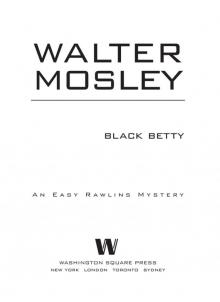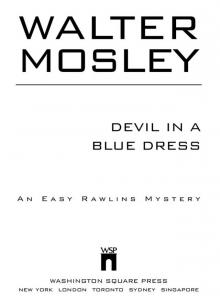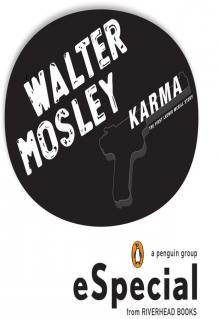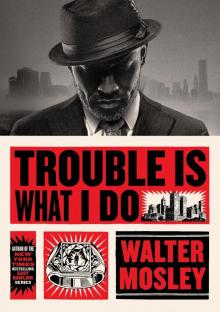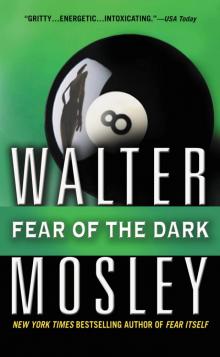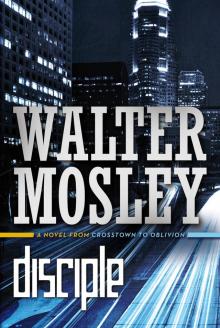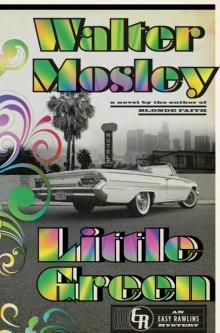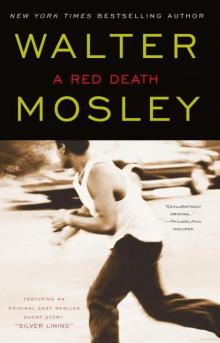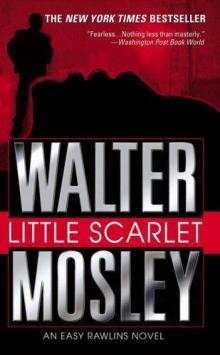Black Betty, page 1





CRITICAL ACCLAIM FOR WALTER MOSLEY’S EASY RAWLINS NOVELS
BLACK BETTY
“As always, Mosley’s grip on character is compelling.”
—People
“Compelling, multilayered.”
—The Washington Post
“Sizzling. . . . A tale of mendacity and violence told with style and flair.”
—Chicago Tribune
“There are echoes of Farewell, My Lovely in Black Betty. . . . Mosley’s words prowl around the page before they pounce, knocking you not so much upside the head as around the body, where you feel them the longest.”
—The New York Times Book Review
“Mosley’s ability to evoke the feel of a given place and time reach out to a readership beyond hard-core mystery lovers.”
—The Christian Science Monitor
“Teeming with violence, bitterness, and compassion, [this] is Mosley’s finest.”
—Kirkus Reviews
“There’s not one false move here. It’s all real and authentic as a low moan in a gut-bucket blues or full-out shout in a Pentecostal church.”
—Quarterly Black Review of Books
“Black Betty is moody, absorbing, and disquieting as a recurrent dream.”
—New York Daily News
“Mysteries don’t get much better than this.”
—Detroit Free Press
DEVIL IN A BLUE DRESS
“I read Devil in a Blue Dress in one sitting and didn’t want it to end. An astonishing first novel.”
—Jonathan Kellerman
“The social commentary is sly, the dialogue fabulous, the noir atmosphere so real you could touch it. A first novel? That’s what they say. Amazing. Smashing.”
—Cosmopolitan
“Richly atmospheric. . . . A fast-moving, entertaining story.”
—Los Angeles Times Book Review
“A sparkling debut novel . . . [A] rich storytelling legacy is constantly and wonderfully present in Devil in a Blue Dress.”
—Chicago Tribune
A RED DEATH
“Exhilaratingly original.”
—Philadelphia Inquirer
“Fascinating and vividly rendered . . . exotic and believable, filled with memorable individuals and morally complex situations.”
—The Wall Street Journal
“The thriller or detective story, raised to a higher level . . . action, suspense, a well-crafted plot . . . fast-moving [and] enjoyable.”
—New York Newsday
“A Red Death is a straightforward, cleanly nasty treat. The writing is funky and knowing, with a no-fools cast.”
—Mirabella
GONE FISHIN’
“It is, in some respects, the best of Mosley’s novels. . . . Mosley displays a pitch-perfect gift for capturing the cadences of black speech that rivals the dialogue in Ralph Ellison’s Invisible Man.”
—Time
“Mosley delivers the goods every time . . . Easy fans are going to eat this up.”
—Library Journal
“A powerfully raw, lyrical coming-of-age story.”
—Publishers Weekly
WHITE BUTTERFLY
“Rawlins . . . might be the best American character to appear in quite some time.”
—Entertainment Weekly
“As rich as the best Chandler and Ross MacDonald. . . . Grabs you by the elbow from the get-go.”
—Chicago Tribune
“Compelling. . . . In all of American fiction, only Richard Wright treats America’s race problem more savagely.”
—Village Voice Literary Supplement
A LITTLE YELLOW DOG
“The bxest book yet in this fine series. Easy Rawlins [is] one of the most distinctive voices in crime fiction.”
—Seattle Times
“[A] well-energized and crafty volume.”
—The New York Times Book Review
BOOKS BY WALTER MOSLEY
PUBLISHED BY POCKET BOOKS
Devil in a Blue Dress
A Red Death
White Butterfly
Black Betty
A Little Yellow Dog
Gone Fishin’
WALTER
MOSLEY
BLACK BETTY
AN EASY RAWLINS MYSTERY
WASHINGTON SQUARE PRESS
NEW YORK LONDON TORONTO SYDNEY
Washington Square Press
A Division of Simon & Schuster, Inc.
1230 Avenue of the Americas
New York, NY 10020
www.SimonandSchuster.com
This book is a work of fiction. Names, characters, places, and incidents either are products of the author’s imagination or are used fictitiously. Any resemblance to actual events or locales or persons, living or dead, is entirely coincidental.
Copyright © 1994 by Walter Mosley “Gator Green” copyright © 2002 by Walter Mosley
Published by arrangement with W. W. Norton & Company, Inc.
All rights reserved, including the right to reproduce this book or portions thereof in any form whatsoever. For information address W. W. Norton & Company, Inc., 500 Fifth Avenue, New York, NY 10110
First Washington Square Press trade paperback printing November 2002
WASHINGTON SQUARE PRESS and colophon are registered trademarks of Simon &Schuster, Inc.
For information about special discounts for bulk purchases, please contact Simon & Schuster Special Sales at 1-800-456-6798 orbusiness@simonandschuster.com
Manufactured in the United States of America
10 9 8 7 6
ISBN-13: 978-0-7434-5178-9
ISBN-10: 0-7434-5178-3
eISBN-13: 978-1-4516-1247-9
THIS BOOK IS DEDICATED TO MY FATHER, WHO DIED ON NEW YEAR’S DAY, 1993.
I MISS YOU, DAD.
FROM WALTER MOSLEY’S SIX EASY PIECES
GATOR GREEN
EASY?” Bonnie’s voice came from the kitchen window. “Yeah,” I said.
I was sitting in a maple chair on the concrete apron that spread out around our back door. I’d just started Jesus’s advanced sailboat-building book. It was going to be his reading assignment for the next three weeks and I wanted to make sure I understood it before he and I started our lessons.
“There’s a man at the front door.”
“He want you or me?” I said in an unfriendly tone.
“Easy.”
She was outside now. All I had to do was turn around and I could see her. But I didn’t turn. I pretended to go on reading even though the words had turned into squirming worms across the page.
“He wants to talk to you,” she said.
I put Juice’s book down on the chair and stood. I stared straight ahead, childishly avoiding her gaze. She touched my arm as I passed her. She always touched me when I was close enough. Especially lately, when I was so upset that I couldn’t even sleep in my own bed.
“WHY YOU SLEEP in the livin’ room, Daddy?” my adopted daughter, Feather, asked when she came upon me one morning and realized that she couldn’t watch cartoons on the living room TV set.
“I been restless,” I said.
“Why don’t you go to a doctor?”
“There’s nuthin’ the doctor got for this.”
I must have sounded sad because Feather put her little golden hand on my neck and sat over me until I fell back to sleep.
“MORNIN’, MR. RAWLINS,” the small white man hailed. He was standing in the doorway between the kitchen and the living room.
“Saul,” I replied. “What are you doing here?”
“Got a little problem I thought you might help me with.”
“Would you like some coffee, Mister . . . ?” Bonnie asked.
“Lynx,” the man told her, “Saul Lynx. And yeah, I’d love a little java in a cup with some milk.”
Saul Lynx was a private detective. He and I worked a case that he started and I took over some years before. When I first met him I didn’t trust him. I didn’t trust many white people. But as it turned out he was okay. It wasn’t until some time later that I found out he had a black wife and three children as light as Feather.
“What’s up?” I asked, herding him into the living room.
“That your wife? She’s beautiful.”
“Bonnie Shay. She lives here with us. Now what is it you want, Saul?” It was Saturday and I was tired from a hard couple of months of work—both on and off the job.
My son, Jesus, had dropped out of school but I was still teaching him every evening; making him read to me and then having him explain what he read. My lover, Bonnie, had admitted that she’d gone away to Madagascar with an African prince who was trying to liberate the continent. She said that they slept in separate rooms but still I couldn’t bring myself to kiss her good night.
I had been slipping back into the street in spite of my respectable job as supervising senior head custodian at Sojourner Truth Junior High School. In less than three months I had investigated arson, murder, and a missing person. I had also been party to a killing that the police might have called murder.
But worst of all, I had found out that my best friend in life was definitely dead. Raymond Alexander, Mouse, had died trying to help me. There wasn’t a place in my mind that I could turn to for hope or a laugh.
THE COFFEE WAS ALREADY BREWED. Bonnie brought Saul his cup and I led the way into the backyard carrying a maple chair for him. We sat side by side looking up at the enormous shade tree that dominated half the yard.
“Good coffee.”
&nbs
Saul gave me a questioning glance and then he smiled. He was a small man who always wore brown. That day it was cotton brown trousers with a brown, blue, and green sweater that had an argyle pattern on the chest. He was also wearing tennis shoes, so I supposed he was on a job.
Saul had a big shapeless nose and a face you would forget two minutes after you saw it. But he had emerald-colored eyes that Hollywood starlets would have paid a hundred thousand dollars to possess.
“I have a cousin-in-law named Ross Henry,” he said.
“Don’t we all.” I was responding to his tone more than his words.
Saul laughed.
“I’ve missed you, Easy.”
“Ross Henry,” I said.
“Yeah.” Saul put his cup and saucer down on the deck and leaned forward, clasping his hands. “Ross is a good kid, man really, he’s thirty-seven. But . . . he never learned how to make it in the white man’s world.”
I grunted and Saul grinned again. He lived among black people and understood the humor in his words.
“But it’s worse with Ross,” he said. “He had an argument at work with his boss which led to a scuffle. He broke the bossman’s nose.”
“Then it’s lucky he lives up here,” I said. “’Cause down in Mississippi they just might have strung him to a tree.”
“Not so much Mississippi as it is Louisiana.” Saul shook his head.
“Say what?”
“Eggersly Oliphant,” Saul said. “Known to the world as “Gator.’ He owns and operates a six-lift garage down on Lincoln, near the beach.”
“Six lifts.” I was impressed.
“Not only that. He owns a small used-car lot across the street and a motel two blocks down. Oliphant is president of the Santa Monica Board of Commerce and a power broker in local politics. A northern Dixiecrat.”
“Ross broke Gator’s nose?” I asked.
“No. Gator’s tough. Very much so. It’s his cousin, a runty little man named Tilly. Tilly called Ross a name that white men shouldn’t use on black people and then he picked up a ten-pound monkey wrench. Ross figured that he had a reason and that the difference in size was made up for by the steel.”
“I’d have to agree with the brother on that,” I said.
“Maybe I would too,” Saul agreed. “But Ross went overboard. He kicked Tilly when he was down and made him lie there while he bad-talked him.”
“So now Ross is in trouble with Tilly or with Gator?”
“Gator. Well, really it’s with the SMPD.”
“For assault?”
Saul shook his head. “Robbery.”
“He robbed him?”
“No. They fired Ross on the spot. That night the garage safe, where they kept the proceeds from all of Oliphant’s businesses, was robbed.”
“And Ross did it?” I asked.
“Gator says so but Ross denies it.”
“But Eggersly is an important man and so the police arrested your wife’s cousin for the job.” It wasn’t hard to figure out.
Saul nodded. “It was definitely an inside job. That’s why Ross could even be arrested. Whoever it was knew exactly where the safe was and what tools they needed to crack it open.”
“What did they use?”
“An acetylene torch from the car lot.”
“And Ross worked there?” I asked.
“He worked all over,” Saul explained. “Ross is a natural mechanic. They used him wherever they had a need. He could fix the ventilation system at the motel and crack open an automatic transmission for the garage.”
“So the cops have it that he broke into the car lot, stole the torch, toted it over to the garage, and then burned the lock off the safe?”
“Actually,” Saul corrected, “it was an old safe. All the guy had to do was burn off the hinges.”
“How much?”
“Between cash receipts, checks, and past due bills, they reported forty-nine thousand and some change.”
“And all the cops got on Ross is that he broke a man’s nose and then they fired him?” I said. “I doubt if they could convict a man on that kinda evidence.”
“Well . . .” Saul looked down at his coffee cup, hesitating, “it’s not that simple.”
“Oh no?”
“No. You see, when Ross was younger he was arrested for assault and robbery. They even convicted him but all he did was six months.”
“Why?”
“It was a dispute he had with a bartender on Central. He had fixed up a TV on a platform so they could play the baseball games at the bar. Ross told the bartender, a man named Grey, that he’d do it for thirty-five dollars, which was his rent at that time. Grey said okay, but when it came time to pay up he said that he had agreed on twenty-five . . .”
There was real feeling in Lynx’s words. I could see that he and Mr. Henry were close.
“Ross fought with Grey, knocked him out and took his thirty-five from the till.”
“And they arraigned him for felony assault and robbery but then argued it down because of extenuating circumstances,” I said, finishing the all-too-common tale.
“There was a woman in the bar, the waitress. She heard the deal and the judge was feeling merciful that day,” Saul said, wrapping up the story.
“So? What he needs is a lawyer. What do you want with me?”
“We got him representation,” Saul said. “But she’s gonna need some help if we want to prove he’s innocent. The problem is if Ross didn’t do it, then somebody else had to.”
“What else they have on him?”
“He was the only one to use the torch. And he was the only one who had access to all the keys except for Gator and his cousin.”
“Why didn’t they take his keys when they fired him?”
“He’d left them at home that morning because it wasn’t his day to lock up.”
“It sure is a mess,” I said. “But what could I do about it that you can’t?”
“That’s just it, Easy. I made the mistake of going over there when Ross got in trouble. I went up against Oliphant and he called me a kike. I didn’t do anything, but let’s just say that there’s no love lost between us.”
“And so you want me to what?”
“He likes people from down around where he comes from,” Saul explained. “Southerners, especially from Louisiana. They got a machinist opening now that Ross is gone . . .”
“I got a job, man,” I complained.
“Yeah, I know. For a favor, Easy.”
It never hurt to have a white man owe you a favor, that’s what I believed. And Saul was a good guy. Even the fact that he was there giving a bad-tempered black man the benefit of the doubt made me want to help him.
And then there was Bonnie and Mouse. Him dead and her —a dead place in my heart.
“Where is this Ross Henry now?”
“We got him out on bail. His mother put up every cent she has for the bond. He’s down in Watts, at his mother’s place.”
* * *
SOMEBODY IN ROSS HENRY’S apartment building had a very bad cough. We heard it from the bottom of the stairs. It was one of those deep, wet, rolling coughs that, in my childhood days, almost always preceded a funeral.
They lived on the third floor of the building, which had been constructed from wood some time before the First World War. The stairs sighed with each step. The colorless paint had separated with the grain of the drying wood planks. The screen door we stopped at was divided into two equal panes. The top screen was as old as the house, rusted and crumbling. The bottom one was brand new, gray, and supple.
The cough was coming from inside the apartment.
Saul knocked but I didn’t think anyone could hear it over that rheumy hacking, so I tried pulling the door open. It was latched from the inside.
I was glancing over to the right, looking for a button or something harder than knuckles to knock with, when Saul said, “Um, Easy.”
Behind the ancient haze of the upper screen I saw a sour- faced black woman with staring yellow eyes.
She coughed.
“I thought you might not have heard us knocking,” I said lamely. “I mean—”
“I’m sick, not deaf,” the woman said and then she suppressed a cough.
“Hello, Clara,” Saul said. “This is Easy Rawlins. He’s a specialist that I’m using to help Ross. Is your son in?”
Clara Henry was tall and dark. She had manly shoulders and hands that had seen so much work that they seemed too large for her body. She looked me up and down and curled her lip.

